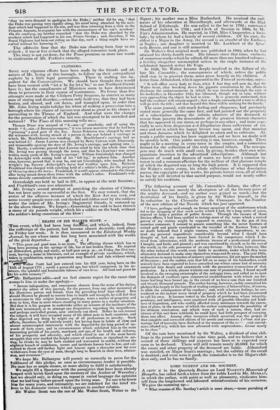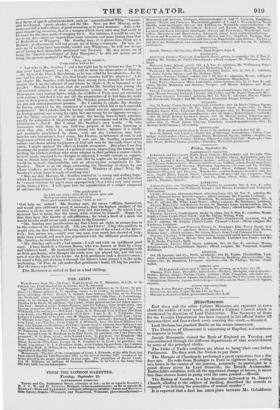LORD NUGENT AND DR. .SOUTHEY.
A CRITI M in the Quarterly Review on Lord NUGENT'S Memorials of Hampden, has called forth a letter from the noble Lord to Mr. MURRAY, in which the author, with point as well as pleasantry, vindicates him- self from the lengthened and laboured animadversions of his reviewer. We give the summing up-
" What remains of Mr. Southey's article is mere abuse,—terras partaking of
that figure of speech called balderdash, such as 'macradicalized Whig,' 'lament.. bewhigged," party pleader,' and the like. Now, my dear Murray, nick- names are filll as bad evidence of good reasoning as of good manners. And, as for mere thundering invective, that is a weapon which every man may find ready to his hand for the mere pains of stooping for it. For instance, it would be easy for me to say this-there are imputations more injurious and more lasting than that of Radicalism or Whiggery. Mr. Southey may, if it please him, think me a Radical ; at all events he will not accuse me of being a renegado. He may ac- cuse me of baying been lamentably misled into Whiggism ; he will not accuse me of having been shamefully pensioned into Toryism. He may accuse me of being the 'bigoted worshipper of John Ha.mpden ;' he will not accuse me of being the apostate apologist of Wat Tyler-.
' Nay, an' he mouth it, I can rant as well as he.'
" And who is Mr. Southey ? and what right has he to lecture me thus ? 'It may assist Lord Nugent,' says he, 'to call to mind the observation of Danton, -the Ajax of the French Revolution, as he was called by his admirers,-for he, too, had his admirers !' Oh, yes that bloody monster had his admirers ! I do not charge Mr. Southey with having been among them, though he would in- ainuate that I am the admirer of one whom he thinks it fit to represent as his parallel. But this I do know, that the youthful Mr. Southey was among the self-recorded admirers of that revolutionary system in which Danton and Robespierre were leading lights, while the scaffolds of Paris were yet streaming with carnage; and that it was not till the perpetrators of it had been for many years in their graves, that the matured Mr. Southey grasped his anti-revolution- ary pen and contemporaneous pension. Do I venture to rebuke Mr. Southey for having ceased to be the encomiast of a system which led to such execrable wickedness? Do I rebuke him for having ruled into the opposite extreme,- for haying quitted, not wrong for right, but one wrong for its opposite wrong,- and for being consistent in this at least, the having been in both extremes equally the antagonist of the principles of good government and of the English constitution ?-Not I. But I adopt Mr. Southey's own words. ' He who fraternizes with them for any half-way purpose of his own, knowing at what they aim, which he cannot choose but know, because it is loudly and insolently proclaimed by them, will, one day (whatever may have been his own intentions), have cause, like Danton, in bitterness of soul, to ask forgiveness of God and man.' And if I now saw Mr. Southey in penitential sadness and shame asking forgiveness of God and man for the rank errors of his youth, I might applaud the effort at humble atonement. But when I see hint assuming the posture and tone of a political censor, impeaching the honesty and reviling the conduct of those who never adopted in their politics a course which, in their minds, required to be changed or repented, I would venture to suggest, that to abstain from judging, to the end that he might not be judged of men, would be, in itself, commendable, and an advantageous compromise for Mr. Southey. There is an old adage concerning the throwing of stones by one whose windows are made of a frail material. Windows of glass? Why, Mr. Southey's whole house is made of nothing else ! "But, my dear Murray, Mr. Southey entertains 'g strong and abiding hope,' which he congratulates himself rests not on human wisdom ;' and he feels that he cannot conclude his paper more appropriately' than with a very sorry sonnet on the General Fast. I will spare him the republication of a sonnet composed 'of sad lines like these- 'The people pray'd
As with one voice ; their ffiuty hearts grew soft With penitental sorrow, and aloft
Their spirit mounted, crying, "God, us ski."' God help us,' indeed ! Mr. Southey says, the verses affiliate themselves, and would give additional proof, if necessary, that the highest intellect of the country is on the same side with that piety and that feelinF.' By which I un- derstand him to mean, that the verses were written by himself. Happy it is that they have this faculty of self-affiliation ; for what a devil of a muse she would be who could swear such a sonnet to the Laureate ! "Mr. Southey may peradventure say that I have no right to assume him to be the writer of the article at all. Oh, yes, but I have! I beg thus publicly to acquit you, my dear Murray, of having told tales out of the school of the Quar- terly; but, answer me,-could ever any man, even much less shrewd of judg- ment than yourself, and much less acquainted with the affiliated productions of Mr. Southey, be mistaken in this?
"Mr. Southey ends with a bad sonnet-.-I will end with an indifferent good story. I have heard of a German Baron, who was known at Bath by a lame and withered hand. He received his wound thus : He was once gambling with an Irish gentleman, who thought the cards were not played fair, and felt very sure it was the Baron at his tricks: the Irish gentleman took a decisive course; he seized a fork, and sticking it through the Baron's band, pinned it to the table, exclaiming, 'If Pam be not under that gentleman's hand, I'll beg his pardon.' But the knave was there."
The Reviewer is nailed as fast as a had shilling.



















































 Previous page
Previous page